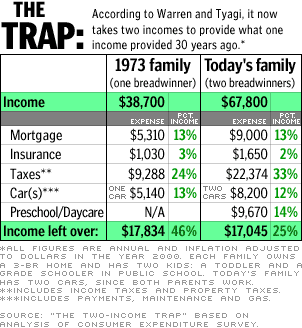
NEW YORK (CNN/Money) – If you feel like it's harder to provide the kind of middle class upbringing for your kids that your parents gave you, you may be right.
According to Elizabeth Warren and Amelia Warren Tyagi, coauthors of "The Two-Income Trap: Why Middle Class Mothers and Fathers Are Going Broke," the average two-income middle class family today earns 75 percent more than the typical single-income family did 30 years ago. But today's family, they say, ends up with less money for everyday living expenses and savings.
Why? The costs of housing and a good education are killing them.

In other words, the authors argue, it now takes two incomes to provide what one income provided 30 years ago: a middle class home in a safe neighborhood with a decent public school.
And that doesn't even factor in the cost of a private school or, for that matter, college, which the authors argue is now viewed as a must-do for today's parents in a way that it wasn't 30 years ago. So, too, is paying for kids to go to a good pre-school.
With faith in the public school system declining, Warren and Tyagi contend, bidding wars erupted for homes in what are thought to be good school districts, making homes in those areas ever more expensive.
The authors also suggest that the rise in two-income families contributed to the rise in home prices, since two-income families could outbid families with only one breadwinner. As a result, now you often need two incomes to be able to buy a home in a middle class neighborhood.
And here's the kicker: The two-income family appears to be in a more precarious position financially than yesteryear's one-income family. Warren and Tyagi calculate today's two-earner family is two-and-a-half times more likely to face a job loss than their counterpart of the early 1970s.
Should one partner's paycheck be lost or reduced, their back is against the wall.
Families can choose to reduce what they spend on food, clothing, savings, vacations or extracurriculars, "but you can't cut back a little on the mortgage or health insurance or tuition," said Warren, a Harvard law professor and bankruptcy specialist.
The wealthy are costing you
Here's another reason the cost of leaving it to Beaver may have become more prohibitive: The consumer behavior of the wealthy has upped the ante for everybody else.
Cornell Professor of Economics Robert H. Frank calls the phenomenon the "expenditure cascade." As he wrote, "When top earners build larger mansions ... they shift the frame of reference that defines an acceptable house for those just slightly below them on the income scale. And when those people respond by building bigger houses, they in turn shift the frame of reference for those just below them, and so on, all the way down."
The median size of a newly built home in 1970 was 1,500 square feet, Frank notes. By 2000, it had increased to 2,300 square feet, even though the median family's income hasn't changed much.
But aren't we better off in other ways?
While it may be true that a great number of middle class families are more strained financially than their parents, some would argue there are a lot of ways our lives have improved relative to a generation ago.
Safety standards are higher, health care has advanced, women now enjoy far greater career opportunities than at any time in history, and it's no longer considered unusual -- or prohibitively expensive -- to visit places across the globe.
And there are some things that actually cost less than they did in your parents' day. Clothes, for instance. You now have a greater number of choices at lower costs thanks to discounters such as Targets or Marshall's, Warren and Tyagi note.
But, according to the authors, that may be little comfort to the family who worries that paying for their daughter's Girl Scout outfit might compromise their ability to make the mortgage next month.
Jeanne Sahadi writes about personal finance for CNN/Money. She also appears regularly on CNNfn's "Your Money," which airs weeknights at 5 p.m. ET. For comments on this column or suggestions for future ones, please e-mail her at everydaymoney@cnnmoney.com.

|

